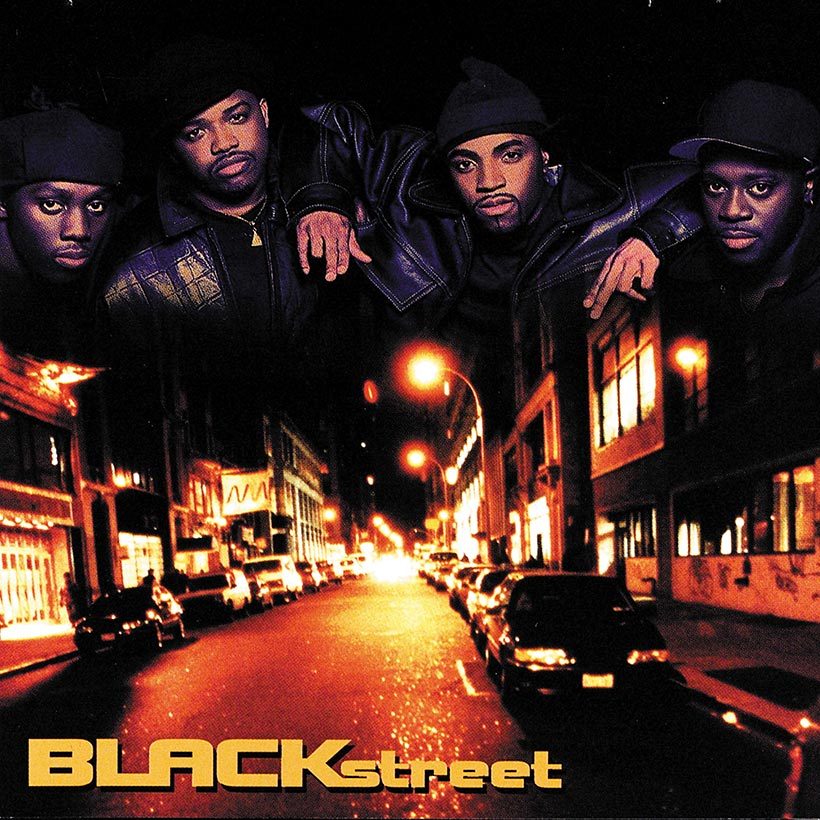Blackstreet’s Debut Album: How Teddy Riley Got His Groove Back
Blackstreet’s debut album saw Teddy Riley find his footing again as a performer, while helping R&B crossover from urban radio to the Top 40.

It’s hard to imagine what R&B sounded like before producer Teddy Riley got his hands on it. As both the inventor and pioneer of New Jack Swing, Riley’s fusion of 70s soul and new-school hip-hop set the bar so high, few have even touched it. Riley spread the New Jack gospel with his 90s R&B group Guy and produced the biggest hits of the decade, but after Guy broke up, Riley retreated to the studio, re-emerging as Blackstreet. Blackstreet’s self-titled album saw Riley find his footing again as a performer, continuing the New Jack tradition while helping R&B crossover from urban radio to the Top 40.
Listen to Blackstreet right now.
The demise of Guy
By the time Teddy Riley made the fateful announcement he was quitting Guy onstage at Madison Square Garden in 1990, the singer/producer was already fielding calls from Michael Jackson to produce Dangerous and had experienced the tragic loss of his friend, and Guy’s manager, Gene Griffin.
Following the dissolution of Guy, Riley decamped to Virginia Beach and continued to work his magic for Heavy D and Wreckx-N-Effect, among others. A year later, Riley decided to start a new group with his friend Chauncey “Black” Hannibal, along with session singers Levi Little and Joseph Stonestreet (the latter was replaced by Dave Hollister before Blackstreet’s self-titled debut album was released.
With Riley masterminding the album’s production and the quartet’s tight harmonies, Blackstreet made their official debut on 21 June 1994 with the release of their self-titled debut album. The group had released one single prior to the album’s release, February 1993’s “Baby Be Mine,” for the soundtrack to Chris Rock comedy CB4, but it was a re-recorded version that appeared on Blackstreet.
“Trendsetters, life-changers and role models”
Blackstreet was the summation of everything that was percolating in the mid-90s. At a whopping 20 tracks, the group covered all the bases: speaker-blasting singles (“Booti Call”), uptown party grooves (“U Blow My Mind”) and slow jams (“Before I Let You Go”).
If it wasn’t abundantly clear already, Blackstreet let you know the score with their intro monologue, “Blackstreet Philosophy,” in which they declare themselves to be “trendsetters, life-changers and role models for the kids.” But with songs like “Make U Wet,” their debut album wasn’t exactly full of family-reunion material. Blackstreet represented both sides of the R&B spectrum: the silky-smooth harmonies of Boyz II Men and the bite of H-Town, with plenty of Riley’s wailing synthesizers and funk bass thrown in.
A sonic dichotomy
This sonic dichotomy scored them two top hits on the Billboard Hot 100 from the jump. First with “Booti Call,” the hard-slapping single co-produced by EPMD’s Erick Sermon that features the standard hip-hop sample, George Clinton’s “Atomic Dog” and a clip of comedian Bill Bellamy defining the “booty call”: a term that would pervade pop culture ad infinitum.
On the other end of the spectrum was “Before I Let You Go,” the quiet storm cut that proved Blackstreet were also master balladeers, sweet-talking their way to No.7 on the Hot 100 and No.2 on the Hot R&B Singles chart. As the highest-charting single off the album, “Before I Let You Go” propelled Blackstreet to platinum status.
Playing the long game
Like any R&B band worth their salt, Blackstreet knows it’s all about endurance. The front half of their debut album is stuffed with uptempo party-starters while the latter half slows things down. “U Blow My Mind” swings and snaps like no other thanks to a sample of The Gap’s Band’s “Outstanding,” while “I Like The Way You Work” sets the foundation for the group’s biggest hit to come, “No Diggity.”
The 90s were a decidedly thirsty decade when it came to lyricism, and Blackstreet were no different, with tracks like “Wanna Make Love,” “Tonight’s The Night,” and the aforementioned “Make You Wet,” featuring a guest verse from Wreckx-N-Effect member and Teddy’s brother, Markell Riley. Markell wasn’t the only guest on Blackstreet’s self-titled debut album. Riley also enlisted the help of two producers he was mentoring, Pharrell Williams and Chad Hugo, who would later become The Neptunes. “Tonight’s The Night” was one of the duo’s first writing credits and featured Hugo on saxophone.
Primed for stardom
One of the most underrated gems on the album, and in Blackstreet’s entire catalogue, is “Joy.” Initially written for Michael Jackson’s Dangerous album, The King Of Pop helped to compose the song, but Riley ended up using it for his own group. With most of the Blackstreet members being young fathers at the time, the group decided to flip the romantic narrative of the song and feature their daughters in the music video, forever changing the context of the single.
Amid all the pillow talk, however, Blackstreet never lost its hip-hop flavor. Much of the album features rap verses and slick flows; it wasn’t until their follow-up, Another Level, that the group softened out their edges completely. Blackstreet’s self-titled debut album set them up for stardom, putting the wheels in motion for Teddy Riley and company to dominate another decade.












